George Frederick Bodley
George Frederick Bodley RA (14 March 1827 – 21 October 1907) was an English Gothic Revival architect. He was a pupil of Sir George Gilbert Scott, and worked in partnership with Thomas Garner for much of his career. He was one of the founders of Watts & Co.
George Frederick Bodley | |
|---|---|
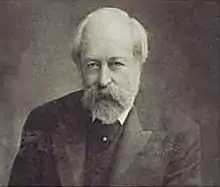 Bodley, c. 1900 | |
| Born | 14 March 1827 Hull, East Riding of Yorkshire, England |
| Died | 21 October 1907 (aged 80) Water Eaton, Oxfordshire, England |
| Occupation | Architect |
| Awards | Royal Gold Medal for Architecture (1899) |
| Practice | Bodley and Garner |
| Buildings | Washington National Cathedral St David's Cathedral, Hobart |
Personal life
Bodley was the youngest son of William Hulme Bodley, M.D., of Edinburgh, physician at Hull Royal Infirmary, Hull, who in 1838 retired to his wife's home town, Brighton, Sussex, England. George's eldest brother, the Rev. W.H. Bodley, became a well-known Roman Catholic preacher and a professor at St Mary's College, New Oscott, Birmingham.
He married Minna F.H. Reavely, daughter of Thomas George Wood Reavely, at Kinnersley Castle in 1872. They had a son, George H. Bodley, born in 1874.
Career
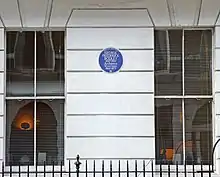
Bodley was articled to the architect Sir George Gilbert Scott, a relative by marriage, under whose influence he became imbued with the spirit of the Gothic revival, and he became known as the chief exponent of 14th-century English Gothic, and the leading ecclesiastical architect in England.[1] He is regarded as the leader of the resurgence of interest in English and Northern European late-medieval design. Noted for his pioneering design work in the Queen Anne revival,[2]
Bodley became acquainted with William Morris in the late 1850s, and in the 1860s his commissions for stained glass and ecclesiastical decoration helped ensure the success of Morris's firm, Morris, Marshall, Faulkner & Co., founded in 1861. Bodley is said to have designed two of Morris's early wallpapers. By the late 1860s Bodley had become disenchanted with Morris, and for stained glass turned to the firm of Burlison and Grylls, founded in 1868, for the glass in his later churches, notably St Augustine's Church, Pendlebury, near Manchester (designed 1870) and the Church of the Holy Angels, Hoar Cross in Staffordshire (designed 1871–72). Bodley worked with his lifelong friend, the stained glass designer Charles Eamer Kempe. They collaborated on projects including: St John the Baptist, Tuebrook in Liverpool; Queens' College Chapel, Cambridge; All Saints, Danehill, East Sussex and the Church of St Mary the Virgin, Clumber Park in Nottinghamshire.[2] His alterations to St Stephen's Church, Gloucester Road, London, the architect and president of RIBA, Harry Stuart Goodhart-Rendel said tamed the work of its founding 'rogue' Victorian architect, Joseph Peacock.[3]
Partnership with Thomas Garner
From 1869 he worked in a twenty-eight-year partnership with Thomas Garner, designing collegiate buildings in Oxford and Cambridge, country houses and churches throughout the British Isles. One cathedral was completed to his design: St David's Cathedral, Hobart in Tasmania, Australia (first design, 1865; revised 1891; building completed 1936). In 1906 Bodley designed with his pupil Henry Vaughan the Washington National Cathedral in Washington, D.C. He also designed Grace Cathedral, San Francisco in 1862, and again for its post-1906 earthquake replacement but it was adapted by his partner after his death.
As well as Vaughan, Bodley and Garner's pupils included the garden designer Inigo Thomas who specialised in formal gardens with geometrical plans in 17th- and 18th-century styles, which suited the houses that Bodley and Garner renovated for wealthy clients.
In 1874 Bodley founded Watts & Co. with Garner and George Gilbert Scott Jr. Bodley, Garner, and Scott all lived on Church Row in Hampstead in the 1860s and 70s.[4][2]
His secular work included the London School Board offices, and in collaboration with Garner, the new buildings at Magdalen College, Oxford, and Hewell Grange, Worcestershire (for Lord Windsor).
Liverpool Cathedral competition
In 1902 Bodley was an assessor for the competition to design Liverpool Cathedral which selected a design by the young Giles Gilbert Scott. When construction of the cathedral began in 1904, Bodley was appointed to oversee Gilbert Scott's work, but had no direct part in its design.
Late works
One of Bodley's final architectural works was the chapel at Bedford School, the foundation stone of which was laid on 18 May 1907 by Lord St John of Bletso. Building took a year, the chapel was consecrated in July 1908, but by which time Bodley had died. The other was the St Chad's parish church, Burton upon Trent. Work started in 1905 and the church was consecrated in 1910. After Bodley's death his partner Cecil Greenwood Hare took over the project; his contribution was the design of an octagonal choir vestry.
Royal Academy
Bodley exhibited at the Royal Academy from 1854. He was elected an associate of the academy in 1881 and a full academician in 1902.
Other activities
As well as being an architect, he was a draughtsman, a connoisseur of art, published a volume of poems in 1899, inspired art works by painters such as John Melhuish Strudwick and designed wallpaper and chintzes for Watts & Co.[1] He served as prime warden of the Fishmongers' Company in 1901–02. In early life he had been in close alliance with the Pre-Raphaelites, and he did a great deal to improve public taste in domestic decoration and furniture.[1]
Death
Bodley died on 21 October 1907 at Water Eaton, Oxfordshire and is buried in the churchyard of the Church of St James, Kinnersley, Herefordshire.
Gallery
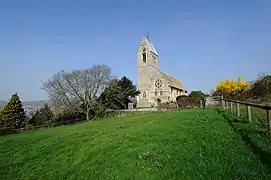 The Church of All Saints, Selsley
The Church of All Saints, Selsley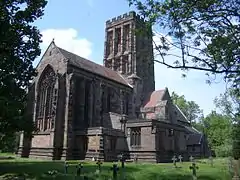 The Church of the Holy Angels, Hoar Cross
The Church of the Holy Angels, Hoar Cross St Mary's Church, Eccleston
St Mary's Church, Eccleston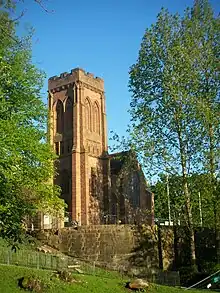 St Bride's Episcopal Church, Glasgow
St Bride's Episcopal Church, Glasgow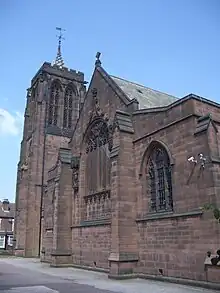
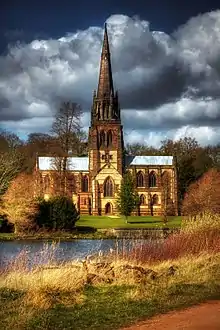
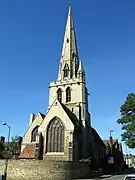
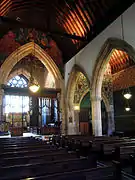 Richly decorated Arts and Crafts interior of All Saints', Cambridge.
Richly decorated Arts and Crafts interior of All Saints', Cambridge.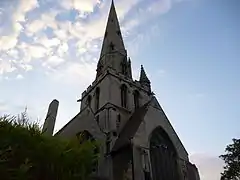 Alternative exterior view of All Saints', Cambridge
Alternative exterior view of All Saints', Cambridge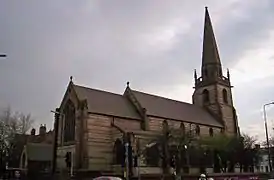 St John the Baptist Church, Tue Brook
St John the Baptist Church, Tue Brook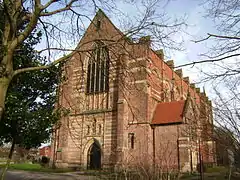
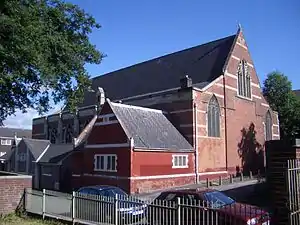 St Alban's Church, Sneinton, Nottingham
St Alban's Church, Sneinton, Nottingham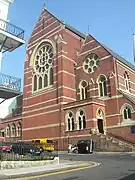
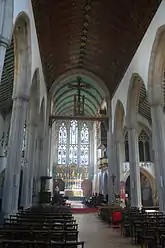 St German's Church, Cardiff (1884)
St German's Church, Cardiff (1884)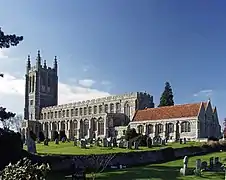
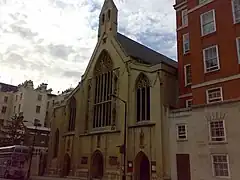
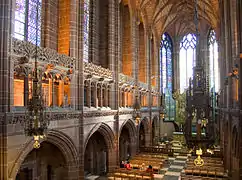 The Lady Chapel of Liverpool Cathedral.
The Lady Chapel of Liverpool Cathedral.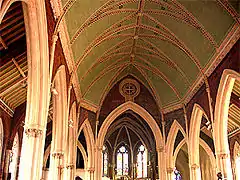 Interior of St John the Divine, Kennington
Interior of St John the Divine, Kennington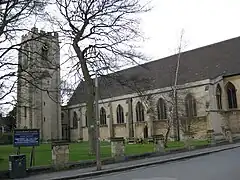 St Matthew's Church, Chapel Allerton, Leeds
St Matthew's Church, Chapel Allerton, Leeds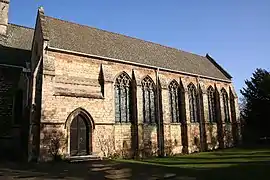 St Peter in Eastgate, Lincoln, is the combined work of three eminent architects - nave and chancel by Sir Arthur Blomfield (1870), south aisle by Temple Moore (1914) and the chancel decoration by Bodley (1884).
St Peter in Eastgate, Lincoln, is the combined work of three eminent architects - nave and chancel by Sir Arthur Blomfield (1870), south aisle by Temple Moore (1914) and the chancel decoration by Bodley (1884).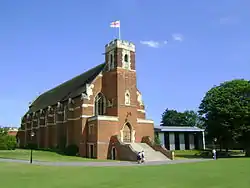 Bedford School Chapel, 1908 - his last work
Bedford School Chapel, 1908 - his last work
Works
New churches
|
|
Church repairs, alterations and furnishings
- 1859–63 St James' Church, Bicknor, Kent: new vestry, porch and roof, reseating and repairs to walls[6]
- 1863–65 All Saints' Church, Coddington, Nottinghamshire: rebuild
- 1864–65 St James' Church, Wigmore, Herefordshire: repairs
- 1864–67 Jesus College Chapel, Cambridge: repairs
- 1866–69 St Michael & All Angels Church, Kingsland, Herefordshire: repairs
- 1868–70 St Mary's Church, Almeley, Herefordshire, with Thomas Garner: repairs
- 1868–70 St Nicholas's Church, South Kilworth, Leicestershire: repairs
- 1870–71 St Mary the Virgin, Barnsley, Yorkshire: repairs
- 1870–73 St Michael's Church, Lyonshall, Herefordshire: repairs
- 1871–72 St Mark's Church, Bilton, Warwickshire, with Thomas Garner: new north aisle, transept and organ chamber, with reseating, reflooring and general repairs to roofs and walls
- 1871–72 Church of St Mary Magdalene, Keyworth, Nottinghamshire: repairs
- 1871–72 St Laurence's Church, Rowington, Warwickshire, with Thomas Garner: repairs
- 1873 St Swithun's Church, East Retford Nottinghamshire: Chantry chapel rebuilt
- 1873–75 Church of St Mary the Virgin, Plumtree, Nottinghamshire, with Thomas Garner: decoration and new organ case
- 1873–79 St Michael's Church, Shalbourne, Berkshire, with Thomas Garner, new south aisle: reseating and general restoration
- 1874 St Helen's Church, Brant Broughton, Lincolnshire: new chancel and repairs
- 1874–78 St Peter & St Paul's Church, Langham, Rutland, with Thomas Garner: repairs to roof, walls, tower and belfry
- 1876–79 St Laurence's Church, Oxhill, Warwickshire, with Thomas Garner: repairs
- 1876–88 St Wilfrid's Church, Hickleton, Yorkshire
- 1880 St Swithun's Church, Leonard Stanley, Gloucestershire
- 1880–83 St Laurence's Church, Frodsham, with Thomas Garner: restoration
- 1881–84 All Saints' Church, Nettleham, Lincolnshire, with Thomas Garner: new vestry and organ chamber, rebuilding and enlargement of chancel, rebuilding of porch and general repairs
- 1882–90 All Saints' Church, Bedworth, Warwickshire, with Thomas Garner: rebuild
- 1884 St Mary's Church, Clifton, Nottinghamshire
- 1885 St Michael's Church, Kirk Langley, Derbyshire, with Thomas Garner: restoration[7]
- 1886–88 St Manakneu's Church, Lanreath, Cornwall, with Thomas Garner: repairs
- 1887 Church of St Giles, Wimborne St Giles, Dorset, remodelling in the Gothic style[8]
- 1889–91 St Giles' Church, Mountnessing, Essex, with Thomas Garner: new vestry/organ chamber, four new nave windows, reseating and general repairs to roof and walls
- 1889–92 St John the Baptist Church, Epping, Essex, with Thomas Garner: rebuild
- 1890 St John the Divine, Kennington, London (interior)
- 1890 St Mary's Church, Nottingham (chapter house)
- 1890 St Saviour's Church, Ellerby Road, Leeds: addition of Pusey chapel.
- 1890–99 St Andrew's Church, Chelmondiston, Suffolk, with Thomas Garner: enlargement
- 1891–1905 All Saints' Church, St Paul's Walden, Hertfordshire, with Thomas Garner: new vestry, new west window in south aisle, reseating and general repairs to roof and walls
- 1892 Holy Trinity Church, Markbeech, Kent: new chancel[9]
- 1892 St Paul's Church, Knightsbridge: new chancel, rood screen and reredos
- 1895 St Martin's Church, Womersley, Yorkshire: rood screen and loft, nave and chancel roof decoration
- 1897 St George in the Meadows, Nottingham: added chancel
- 1898 St Bartholomew's Church, Wilmslow: clerestory added to chancel
- 1898–1903 Holy Trinity Church, Long Melford: refurbishment of main tower
- 1898–1905 St Bartholomew's Church, Reading, Berkshire: new chancel, north chapel, vestry and chapel at east end of south aisle
- 1898–1905 St Paul's Church, Bedford: reorder chancel, restore choir stalls and new rood screen
- 1899–1901 All Saints' Church, East Horndon, Essex: repairs
- 1899–1904 St Carantoc's Church, Crantock, Cornwall, with Edmund Harold Sedding: repairs
- 1900–01 St Nicholas' Church, Little Bowden, Northamptonshire: repairs
- 1901 St Peter's Church, Hartshorne, Derbyshire: enlargement
- 1901 St Mary's Church, Whitkirk, Leeds: rebuilt
- 1902–05 St Mary the Virgin, Barton Mills, Suffolk: repairs
- 1903 St Stephen's, Gloucester Road, London, with Walter Tapper: new reredos and other alterations
- 1903–04 Christ Church, Mold Green, Kirkheaton, Yorkshire: new chancel, vestry & organ chamber
- 1904 St Bartholomew's Church, Elvaston repairs and rebuilding of the chancel
- 1905–07 St Nicholas' Church, Skirbeck, Lincolnshire: new vestries, organ chamber and porches, several new windows, rebuilding of chancel, reseating and general repairs
- 1906 Church of the Annunciation to the Blessed Virgin Mary, Souldern: dismantled and rebuilt bell tower and tower arch
- 1906 Holy Angels Church, Lilliput Road, Poole, Dorset: rood screen, choir stalls and organ case[10]
- 1906 St Barnabas Church, Pimlico, London: reredos, rood screen and (with Hill and Son) organ case[11]
- 1907 St Barnabas Church, Hove: reredos
- 1907–09 All Saints' Church, Kedleston: north aisle
- St Paul's, Burton upon Trent: alterations
Secular buildings
- 1870 Queens' College Old Hall, Cambridge, decoration
- 1872–76 Offices of the London School Board (with Thomas Garner), (demolished 1929)
- The Wodehouse near Wombourne, for the Shaw-Hellier family
- Hewell Grange
- 1905: Second Boer War Memorial, York
References
- One or more of the preceding sentences incorporates text from a publication now in the public domain: Chisholm, Hugh, ed. (1911). "Bodley, George Frederick". Encyclopædia Britannica. Vol. 4 (11th ed.). Cambridge University Press. p. 110.
- "George Frederick Bodley (1827–1907)" (PDF). Bodley & Kempe Centenary: A celebration of Victorian church art and design. The Churches Conservation Trust. 1 July 2007. Archived from the original (PDF) on 10 November 2007. Retrieved 30 May 2008.
- Historic England. "Details from listed building database (1293603)". National Heritage List for England. Retrieved 24 October 2013.
- Hall, Michael (2016) [2004]. "Bodley, George Frederick". Oxford Dictionary of National Biography (online ed.). Oxford University Press. doi:10.1093/ref:odnb/31944. (Subscription or UK public library membership required.)
- Homan 1984, p. 57.
- Homan 1984, p. 106.
- Historic England. ": Church of St Michael, Kirk Langley (Grade I) (1109095)". National Heritage List for England. Retrieved 21 November 2012.
- "Wimborne St. Giles," in An Inventory of the Historical Monuments in Dorset, Volume 5, East, (London: Her Majesty's Stationery Office, 1975), 92-104. British History Online, accessed May 18, 2022
- Homan 1984, p. 75.
- Newman & Pevsner 1972, p. 334.
- "St Barnabas Church - Guide".
Sources
- Lee, Sidney, ed. (1912). . Dictionary of National Biography (2nd supplement). Vol. 1. London: Smith, Elder & Co. pp. 187–190.
- Homan, Roger (1984). The Victorian Churches of Kent. Chichester: Phillimore & Co. Ltd. ISBN 0-85033-466-7.
- Newman, John; Pevsner, Nikolaus (1972). Dorset. The Buildings of England. Harmondsworth: Penguin Books. ISBN 0-14-071044-2.
- Pevsner, Nikolaus (1951). Nottinghamshire. The Buildings of England. Harmondsworth: Penguin Books.
- Pevsner, Nikolaus (1963). Herefordshire. The Buildings of England. Harmondsworth: Penguin Books.
- Pevsner, Nikolaus (1966). Berkshire. The Buildings of England. Harmondsworth: Penguin Books.
- Pevsner, Nikolaus (1973) [1966]. Buckinghamshire. The Buildings of England. Harmondsworth: Penguin Books. ISBN 0-14-071019-1.
- Pevsner, Nikolaus (1968). Worcestershire. The Buildings of England. Harmondsworth: Penguin Books.
- Pevsner, Nikolaus; Cherry, Bridget (1973) [1961]. Northamptonshire. The Buildings of England. Harmondsworth: Penguin Books. ISBN 0-14-071022-1.
- Pevsner, Nikolaus; Cherry, Bridget (revision) (1975) [1963]. Wiltshire. The Buildings of England. Harmondsworth: Penguin Books. ISBN 0-14-0710-26-4.
- Pevsner, Nikolaus; Lloyd, David (1967). Hampshire and the Isle of Wight. The Buildings of England. Harmondsworth: Penguin Books.
- Pevsner, Nikolaus; Wedgwood, Alexandra (1966). Warwickshire. The Buildings of England. Harmondsworth: Penguin Books.
- Sherwood, Jennifer; Pevsner, Nikolaus (1974). Oxfordshire. The Buildings of England. Harmondsworth: Penguin Books. ISBN 0-14-071045-0.
- Verey, David (1970). Gloucestershire: The Cotswolds. The Buildings of England. Harmondsworth: Penguin Books. ISBN 0-14-071040-X.